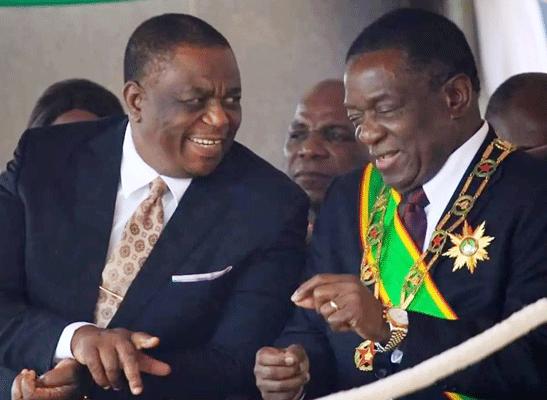News / National
Mnangagwa, Chiwenga fight intensifies
04 Oct 2024 at 07:51hrs |
0 Views

The internal strife within Zimbabwe's ruling party, Zanu-PF, has escalated dramatically, with various factions vying for control as they seek to consolidate power or displace incumbent leaders before their terms expire. The tensions are largely fueled by accusations of rampant corruption and a failing economy, which have caused the value of the recently introduced Zimbabwe Gold (ZiG) currency to plummet against the US dollar, provoking public outrage.
The schism within the party has been underscored by a stark letter from Munyaradzi Machacha, the Zanu-PF national political commissar, which cautioned party members elected to the influential District Coordinating Committees (DCCs) against sowing division. These grassroots structures play a crucial role in electing presidential nominees during party congresses.
In the letter, dated October 2, 2024, and addressed to all Zanu-PF provincial chairpersons, Machacha detailed the troubling behavior of certain DCC members, indicating that they were resurrecting tactics reminiscent of the previously dissolved DCCs, which had historically acted as "kingmakers."
"The Politburo has observed with great concern the wayward behaviour of some members of the DCCs. The following issues have been observed… members of the DCC have resurrected the role previously played by the ‘old dissolved DCCs' of becoming the King Makers," Machacha wrote.
He criticized DCCs for overstepping their authority and making executive decisions outside their constitutional mandate, a violation of Article 13, Section 154 of the party constitution. The DCCs are not permitted to make executive decisions, which should be reserved for the Provincial Executive Committee and the Provincial Coordinating Committee.
Machacha also pointed out the practice among some DCCs of excluding certain members from meetings to strengthen their grip on power. "The tendency of DCCs to hold meetings and only invite the twenty-two (22) elected members, leaving out the leadership in the district, is contrary to the party Constitution," he stated.
In a bid to exclude opponents, some factions are reportedly scheduling meetings at times that are inconvenient for others, such as weekdays when many members are at work. Additionally, Machacha condemned DCC members who are prematurely campaigning for parliamentary positions, undermining the authority of sitting National Assembly members.
"DCCs, therefore, be warned to desist from this reactionary conduct. Going forward, the party will take stern measures against perpetrators through severe disciplinary measures," Machacha warned.
The DCCs were reintroduced in 2020 after being disbanded eight years prior due to their role in fostering factionalism within the party. Their previous dissolution was believed to have shifted the balance of power toward then-vice president Joice Mujuru at the expense of rival Mnangagwa.
Experts argue that neither Mujuru nor Mnangagwa truly emerged victorious from the DCC conflict, as the centralization of power ultimately prevailed over decentralization and modernization efforts. Consequently, the Presidium, Politburo, and Central Committee continue to be pivotal power brokers within Zanu-PF, shaping the party's future amidst growing tensions and discontent.
The schism within the party has been underscored by a stark letter from Munyaradzi Machacha, the Zanu-PF national political commissar, which cautioned party members elected to the influential District Coordinating Committees (DCCs) against sowing division. These grassroots structures play a crucial role in electing presidential nominees during party congresses.
In the letter, dated October 2, 2024, and addressed to all Zanu-PF provincial chairpersons, Machacha detailed the troubling behavior of certain DCC members, indicating that they were resurrecting tactics reminiscent of the previously dissolved DCCs, which had historically acted as "kingmakers."
"The Politburo has observed with great concern the wayward behaviour of some members of the DCCs. The following issues have been observed… members of the DCC have resurrected the role previously played by the ‘old dissolved DCCs' of becoming the King Makers," Machacha wrote.
He criticized DCCs for overstepping their authority and making executive decisions outside their constitutional mandate, a violation of Article 13, Section 154 of the party constitution. The DCCs are not permitted to make executive decisions, which should be reserved for the Provincial Executive Committee and the Provincial Coordinating Committee.
In a bid to exclude opponents, some factions are reportedly scheduling meetings at times that are inconvenient for others, such as weekdays when many members are at work. Additionally, Machacha condemned DCC members who are prematurely campaigning for parliamentary positions, undermining the authority of sitting National Assembly members.
"DCCs, therefore, be warned to desist from this reactionary conduct. Going forward, the party will take stern measures against perpetrators through severe disciplinary measures," Machacha warned.
The DCCs were reintroduced in 2020 after being disbanded eight years prior due to their role in fostering factionalism within the party. Their previous dissolution was believed to have shifted the balance of power toward then-vice president Joice Mujuru at the expense of rival Mnangagwa.
Experts argue that neither Mujuru nor Mnangagwa truly emerged victorious from the DCC conflict, as the centralization of power ultimately prevailed over decentralization and modernization efforts. Consequently, the Presidium, Politburo, and Central Committee continue to be pivotal power brokers within Zanu-PF, shaping the party's future amidst growing tensions and discontent.
Source - NewZimbabwe
Join the discussion
Loading comments…
































